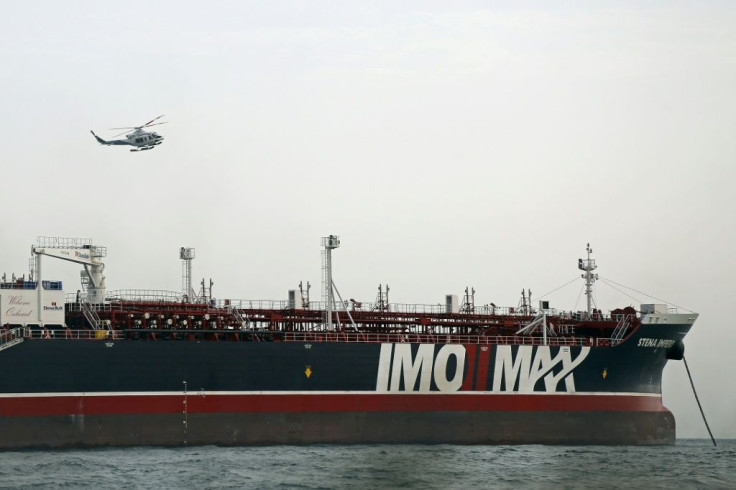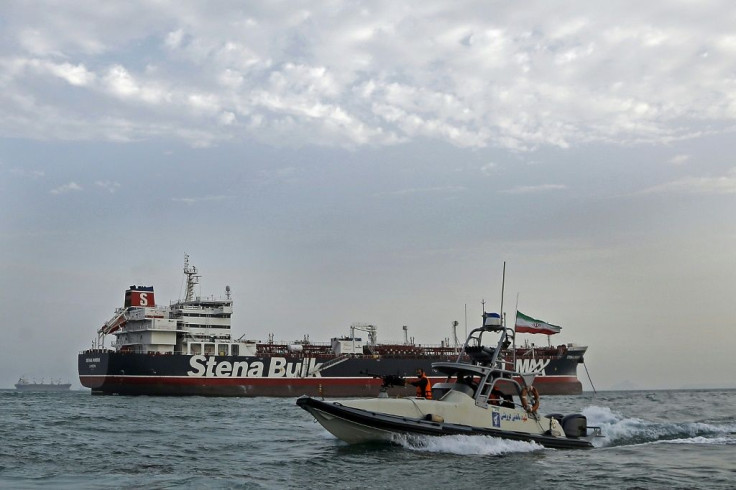US - Iran Tensions: Will Tehran Block Strait Of Hormuz, Disrupting Oil Supplies?

KEY POINTS
- Oil prices spiked to $72 overnight but then fell back after Iranian missile barrage
- The missiles were a response to the U.S. drone strike that killed Iranian Gen. Qassem Soleimani
- Traders fear Iran could disrupt movements through the Strait of Hormuz, the main chokepoint for Middle East oil shipments
Oil prices fell in early trading Wednesday despite fears of tensions between the U.S. and Iran disrupting supplies.
Iran fired a dozen missiles overnight at two Iraqi bases housing U.S. forces, but initial reports indicated there were no casualties and little damage. The missile barrage was in retaliation for last week’s targeted drone strike against Iranian Gen. Qassem Soleimani just outside Baghdad airport.
Oil spiked to nearly $72 a barrel overnight amid fears of a worsening conflict, but since then, traders appeared to shrug off the dangers with oil trading in the $61-$68 range Wednesday morning. The $72 level was a far cry from the $145.93 price tag in June 2008.
Iranian Foreign Minister Javad Zarif indicated the overnight missile launch was its response to Soleimani’s death, calling the action “proportionate.”
“We do not seek escalation or war, but will defend ourselves against any aggression,” he tweeted.
Iran took & concluded proportionate measures in self-defense under Article 51 of UN Charter targeting base from which cowardly armed attack against our citizens & senior officials were launched.
— Javad Zarif (@JZarif) January 8, 2020
We do not seek escalation or war, but will defend ourselves against any aggression.
U.S. President Donald Trump was expected to address the nation at 11 a.m. EST Wednesday. Late Tuesday, he tweeted, “All is well.”
Yet fears remain tensions between the U.S. and Iran in light of Tehran’s decision to rev up its nuclear program and Trump’s vow against allowing the Islamic state to obtain a nuclear weapon.
Numerous countries, including Japan and China, have sent naval assets to the Persian Gulf to protect oil shipments through the Strait of Hormuz, described by the U.S. Energy Information Administration as “the world’s most important oil transit chokepoint.” In 2018, nearly 21 million barrels of crude daily, about 21% of the global consumption, passed through the strait, which connects the Persian Gulf to the Gulf of Oman and last year saw a string of attacks on tankers.
Most of the crude exports from Iraq, Iran and Saudi Arabia pass through the strait.
“There are limited options to bypass the Strait of Hormuz. Only Saudi Arabia and the United Arab Emirates have pipelines that can ship crude oil outside the Persian Gulf and have the additional pipeline capacity to circumvent the Strait of Hormuz,” the EIA notes.
Energy intelligence company Vortexa Ltd. reported oil stockpiles are at their lowest level in three years. The company reported the amount of oil stored in tankers and floating storage vessels fell by 38 million barrels in the week ended Monday, with commercial inventories in developed countries approaching 2.95 billion barrels this month, a 61-day supply.
Investment analyst James Eginton of Tribeca Investment Partners predicted a sharp hike in oil prices if Iran blocks the strait.
“If you block the Strait of Hormuz, you will send oil through $100,” Eginton told CNBC.
“The market’s clearly worried about the potential for supply disruptions but there’s no obvious path forward from here,” Lachlan Shaw, head of commodity research at National Australia Bank, told FX Empire.
“It’s all a matter of scenarios that may impact oil production or not, so the market seems to have recalibrated in the last 24 to 36 hours on some of those likelihoods.”
Stewart Glickman, an energy analyst at CFRA Research, said disrupting shipments through the strait would affect a lot of countries.
"The most effective oil weapon — shutting the Strait of Hormuz — would damage a broad set of countries — not just the U.S. — and may make it harder for Iran to find allies in its skirmishes with the U.S.," Glickman told Deutsche Welle. "Keep in mind though that Iran wouldn’t be selling crude oil either, and it would become a pariah in the international arena since all oil-importing nations would suffer."
Traders had feared Iran would retaliate for Soleimani’s death by attacking oil production in Saudi Arabia and the United Arab Emirates. In September, an attack on Saudi operations knocked out half the kingdom’s operations, about 5% of the global supply. Washington and Riyadh blamed the attack on Iran, but Iran-backed Houthi rebels in Yemen claimed responsibility.

© Copyright IBTimes 2024. All rights reserved.





















